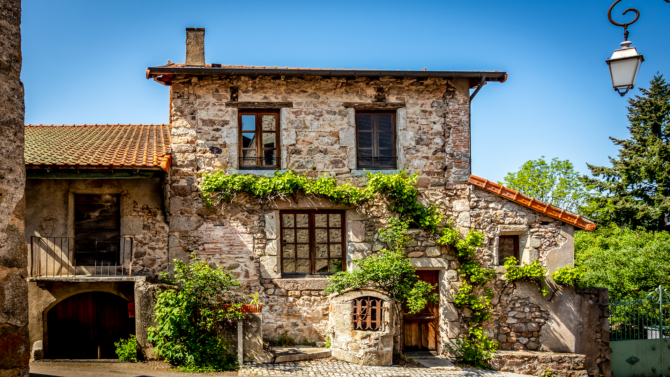Capital Gains Tax in France: A Complete Guide

Charlotte Macdonald discusses why it is important to consider capital gains tax in both France and the UK when selling or giving away a French property as a UK tax resident.
WHAT EXACTLY IS CAPITAL GAINS TAX?

(c) Image by pch.vector on Freepik
In the UK, capital gains tax (CGT) is assessed when you sell or give away a property that has risen in value since the date that you acquired it.
If you are a UK tax resident, you will pay CGT on your worldwide gains, not just those in the UK (unless you are a relatively recent arrival in the UK and claim the remittance basis). So, if you own a property in France that you intend to sell or give away, you should keep this UK tax in mind.
UK CGT on residential property is charged at 20% or 28%, depending on whether you are a basic or higher rate tax payer. Although there are a number of similarities between CGT charged in France and the UK, there are also a number of important differences.
DOUBLE TAX TREATY
There is a double taxation treaty (2008) between France and the UK that confirms which country can levy CGT on a property and, where double taxation arises, how it can be mitigated. The treaty confirms that CGT can be levied by the country in which the property is situated. So, if a property in France is sold for a profit, the French authorities have the right to tax that profit.
However, as a matter of general tax law, a UK resident will be taxed on their worldwide gains. To reduce double taxation, the treaty states that any CGT charged in France can be offset against any UK CGT charged on the same profit.
For example, Erica, a UK resident, sells her French holiday home for a profit of £100,000. She has £18,000 of CGT to pay in France and £20,000 of CGT to pay in the UK. Erica can credit the £18,000 already paid in France against the £20,000 payable in the UK. This means that she only has to pay £2,000 to HMRC.
GIFTING
One of the largest differences in how CGT is applied in the UK compared to in France relates to gifting. In France, CGT is not assessed when making a gift, whereas in the UK it is.
Although by giving property away you are not making a profit, HMRC will still look at the rise in the value of the property since the date of acquisition compared to its open-market value at the time it is given away.
For example, Henry, a UK resident, bought a holiday home in Normandy in 1990 for the equivalent of £25,000. In 2023, the property is given an open-market valuation of £100,000. Henry wishes to give the property to his son. There wouldn’t be any French CGT to pay if Henry gives the property away, but for UK tax purposes he would be treated as having made a ‘deemed disposal’ of the property. The gain of £75,000 in the value of the property would be assessed for UK CGT and this sum would be payable by Henry.
PRIVATE PRINCIPLE RESIDENCE RELIEF
Both in the UK and in France, there is an important relief against CGT if the property you are selling is your main home. In the UK, this is known as your private principle residence relief (PPR), and it confirms that you will not pay any CGT on any gain realised on the sale of your primary home.
This means that if you own one property in which you live, you will not pay CGT if you sell it, even if its value has gone up significantly since you first acquired it.
PPR can be apportioned to your home during the time in which you lived in it. For example, Emma’s main home was in France for five years, before she moved back to the UK. After five years of living in the UK, Emma decides to sell the French property. There is a gain of £50,000. As the property was her home for 50% of the time that she owned it, Emma can claim PPR over 50% of the gain. A quirk of the law is that Emma can also claim PPR for the final nine months that she owned the property- even if she was not living there during that time.
LONG-TERM OWNERSHIP RELIEF
In France, another important relief is that related to long- term ownership. The amount of CGT payable is tapered down between six years and 22 years of ownership, so that by the 23rd year of ownership, CGT will not be payable.
There is no equivalent long- term ownership relief available against UK CGT.
For example, Miriam, a UK resident, owns an apartment in the French Alps, which she purchased 40 years ago. When Miriam sells the property, she makes a gain of £250,000. As she has owned the property for such a long time, there is no French CGT to pay. However, Miriam still has to pay UK CGT on the gain.
SOCIAL CHARGES
In France, if your property is sold for a gain, social charges are assessed on the gain, in addition to CGT. This contrasts with taxation in the UK, where CGT is the only tax assessed on a gain – national insurance payments are not charged on capital gains.
DEATH UPLIFT
Both in the UK and in France, there is a ‘death uplift’ for CGT purposes.
This means that when a person inherits a property, they will acquire it with the value at the date of death of the previous owner.
For example, Brian, a British resident, inherits an apartment in Paris from his father, who had bought the apartment for £200,000. At the time of Brian’s father’s death in June last year, the property was worth £300,000. The property is still worth £300,000.
If Brian sells the property at this price, there will be no CGT to pay – this is because the CGT is calculated on the value of the property in June last year, not the value when Brian’s father purchased it.
CHANGES IN 2023
Individuals in the UK currently have an annual exempt allowance (AEA) of £12,300 per year. This means that an individual can realise gains of £12,300 before they have to start paying CGT on them.
From 6 April 2023, this amount is set to be reduced to £6,000 per year, with a further reduction to £3,000 per year being introduced from 6 April 2024.
For example, James sells his French holiday home in Brittany. There is a gain of £10,000. Currently he doesn’t have to pay any UK CGT because the gain he has made is less than his AEA of £12,300 (James has made no other gains in this tax year).
If the sale of the holiday home doesn’t happen until May 2023, it will fall into the next UK tax year (2023/2024). James will therefore have to pay UK CGT, because his new reduced AEA won’t cover the whole of the gain, however, it will help to reduce the taxable gain to just £4,000 (£10,000 gain less £6,000). If he sold a year later with the same profit, his taxable gain would be £7,000.
Charlotte Macdonald is a Senior Associate Solicitor in the international and cross-border team at the English law firm Stone King LLP. You can find our more about capital gains tax on FrenchEntrée
Want to find more expert advice and guidance?
The unique mix of legal, financial and tax advice along with in-depth location guides, inspiring real life stories, the best properties on the market, entertaining regular pages and the latest property news and market reports makes French Property News magazine a must-buy publication for anyone serious about buying and owning a property in France.
With nearly 20 years of experience and a network of trusted partners and experts, FrenchEntrée is your go-to resource for buying property and living in France.
Lead photo credit : (c) Shutterstock
Share to: Facebook Twitter LinkedIn Email
More in expert advice, french property, Living in France, taxes



